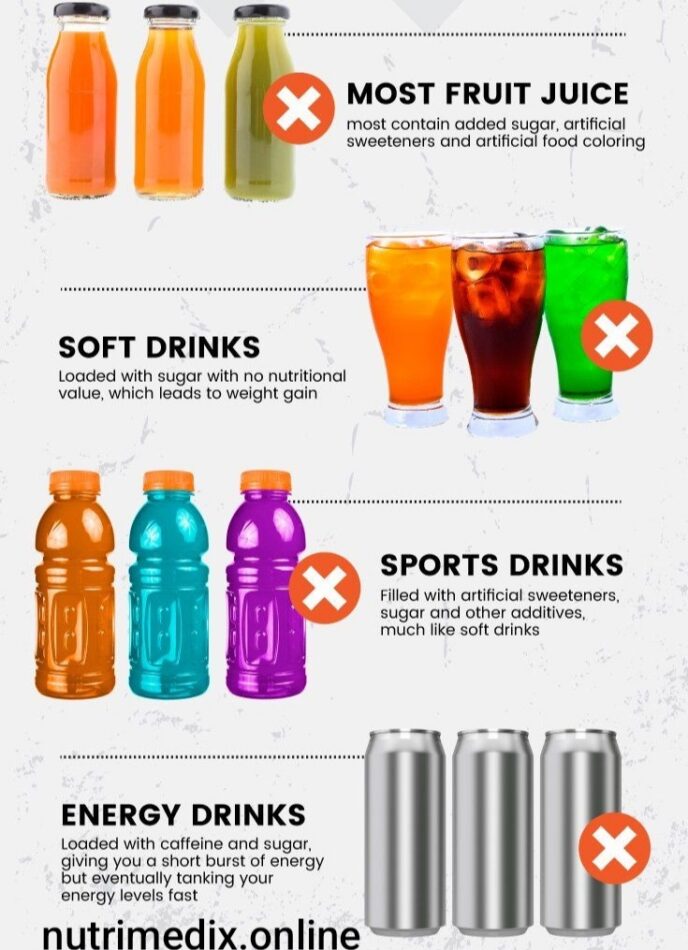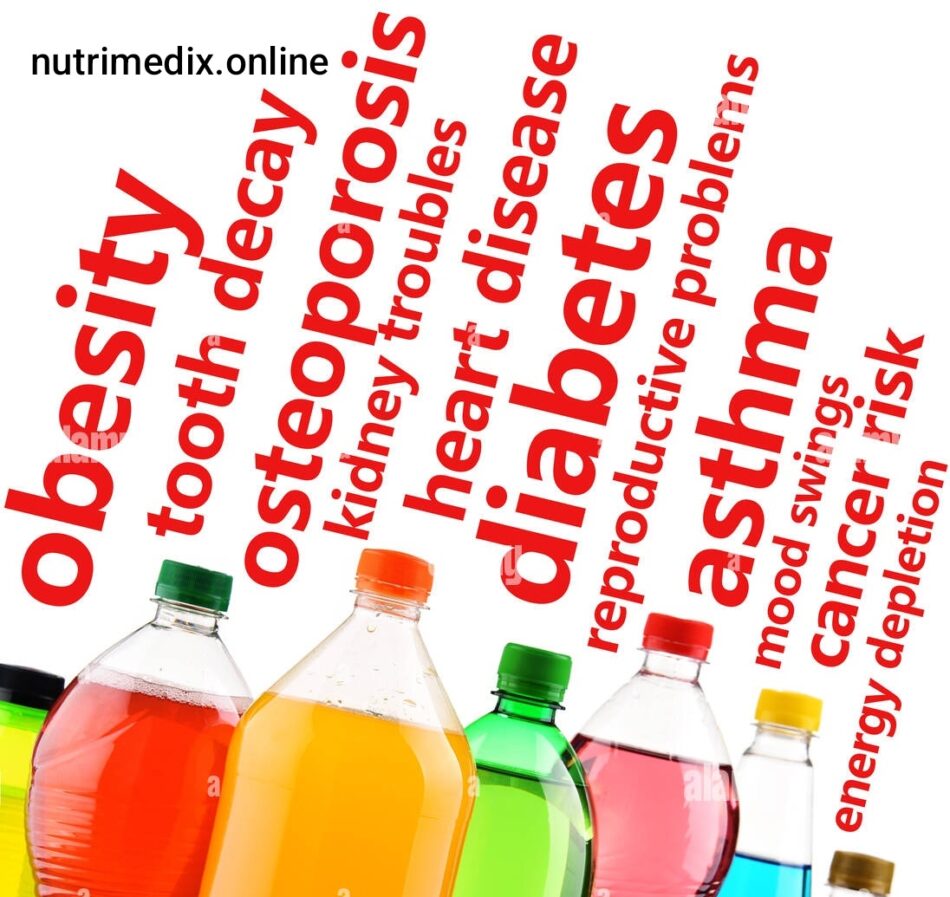Understanding soft drink, their composition ,Statistics and 10 harms of it on human health
What are Soft Drinks?
A soft drink is a non-alcoholic, carbonated beverage that is usually sweetened and flavored. It can come in many forms, including soda, fizzy drinks, or pop. These drinks are typically served cold and are popular worldwide for their refreshing taste. They can be categorized into various types such as colas, fruit-flavored sodas, and other specialty drinks.
Composition of Soft drink
Soft drinks are popular fizzy beverages made up of several key ingredients:
- Water: The main ingredient, making up most of the drink, usually carbonated to give that bubbly fizz.
- Sweeteners: Either sugar, high-fructose corn syrup, or artificial sweeteners (for diet versions) to add sweetness.
- Carbonation: Carbon dioxide gas creates the fizz and makes the drink refreshing.
- Flavors: Natural or artificial flavors, like cola, fruit flavors (lemon, orange), or spices, give soft drinks their distinctive taste.
- Acids: Ingredients like citric acid or phosphoric acid give a tangy taste and help preserve the drink.
- Preservatives: Substances like sodium benzoate help prevent the drink from spoiling.
- Coloring: Artificial colors or caramel coloring make the drink visually appealing.
- Caffeine: Some soft drinks, like cola, contain caffeine for a slight energy boost.

In simple terms, soft drinks are carbonated, sweetened beverages with added flavors and preservatives to make them tasty and long-lasting.
10 harms of Soft drinks
Drinking sugary soft drinks can seriously harm your health, particularly if consumed in large amounts. Here’s a summary of the key risks:
- Weight Gain: Sugary drinks don’t make you feel full, meaning you can easily consume more calories without realizing it. Over time, this leads to weight gain, as the liquid sugar doesn’t trigger satiety like solid food does.
- Fatty Liver: The fructose found in sugary soft drinks is processed in the liver. When consumed in excess, the liver turns this sugar into fat, leading to nonalcoholic fatty liver disease, a condition that can cause long-term liver damage.
- Belly Fat: High intake of sugary drinks, especially those with fructose, leads to the accumulation of visceral fat, or belly fat, which surrounds your organs. This type of fat increases the risk of serious conditions like heart disease and type 2 diabetes.
- Insulin Resistance: Sugary soft drinks can cause your body to become less sensitive to insulin, the hormone responsible for regulating blood sugar. As a result, your body has to produce more insulin to manage blood sugar levels, which can lead to insulin resistance—a precursor to metabolic syndrome, heart disease, and diabetes.
- Type 2 Diabetes: There is a strong connection between sugary drinks and the development of type 2 diabetes. Regular consumption of these drinks increases blood sugar levels, which over time can contribute to insulin resistance and eventually lead to diabetes.https://nutrimedix.online/what-is-diabetes-4-prevention-tips/
- Empty Calories: Soft drinks provide no essential nutrients—just sugar and calories. They contribute to your daily calorie intake without providing any vitamins, minerals, or fiber, making them nutritionally poor choices that can lead to weight gain and other health problems.
- Leptin Resistance: Leptin is the hormone that tells your brain when you’re full. Excessive sugar intake, particularly fructose, can interfere with this process, leading to leptin resistance. This makes it harder for your body to regulate hunger, which can lead to overeating and weight gain.
- Addiction: Sugar has addictive properties, activating the brain’s reward system in ways similar to addictive substances. This can cause cravings and lead to a cycle of overconsumption, making it difficult for some people to reduce their sugary drink intake without experiencing withdrawal-like symptoms.
- Heart Disease: Drinking soda regularly raises risk factors for heart disease, such as high blood sugar and increased levels of harmful cholesterol (LDL). Studies show that individuals who consume sugary drinks daily have a significantly higher risk of developing or dying from heart disease.
- Cancer Risk: Research suggests that sugary soft drinks may increase the risk of certain cancers. For instance, people who drink two or more sodas a week may have a higher chance of developing pancreatic cancer. Women who consume sugary drinks may also be at higher risk for endometrial cancer.
- Dental Damage: The acids in soda, combined with sugar, are harmful to your teeth. The acidic environment erodes tooth enamel, while sugar feeds bacteria that lead to tooth decay and cavities. Over time, this can cause significant dental problems.
- Gout: Gout is a painful condition caused by the buildup of uric acid in the blood, leading to inflammation in the joints. Drinking sugary soft drinks, particularly those containing fructose, can increase uric acid levels and significantly raise the risk of developing gout.
- Dementia Risk: High sugar intake has been linked to cognitive decline and an increased risk of dementia. Sugary drinks cause rapid spikes in blood sugar, and over time, this can negatively affect brain function, raising the risk of conditions like Alzheimer’s disease.

In short, regularly consuming sugary soft drinks can lead to a wide range of health issues, including weight gain, liver damage, diabetes, heart disease, cancer, and even cognitive decline. Reducing or eliminating sugary drinks from your diet can significantly improve your long-term health and well-being.
Statistics
Studies showed that drinking 3 cans of soda increases tooth decay by 62% while consuming one cane increases decay by 3% among children. Millions of people suffer due to addiction to soft drinks. Carbonated beverages are very popular and often used by people worldwide.
Conclusion
In conclusion, avoiding sugary soft drinks can have a profound impact on your overall health and well-being. These beverages contribute to weight gain, increase the risk of chronic diseases like type 2 diabetes, heart disease, and even certain cancers, and harm vital organs such as the liver and brain. Additionally, they provide no nutritional value, only empty calories that can lead to long-term health problems. By cutting out or significantly reducing soft drink consumption, you can improve your energy levels, maintain a healthy weight, protect your dental health, and lower your risk for serious conditions. Choosing healthier alternatives like water, herbal teas, or natural juices not only benefits your body but also promotes long-lasting wellness.

